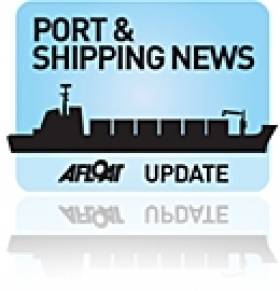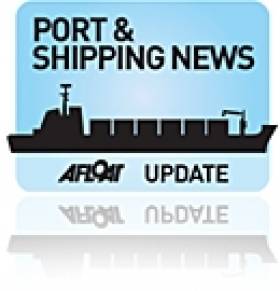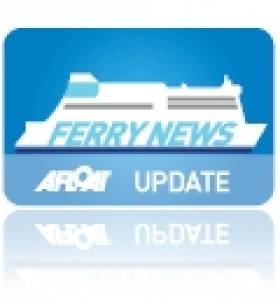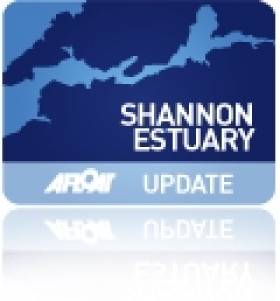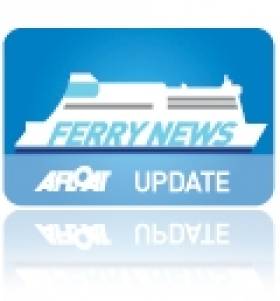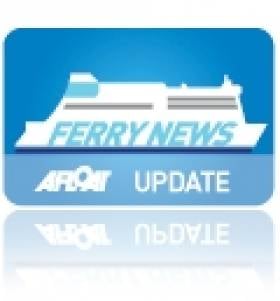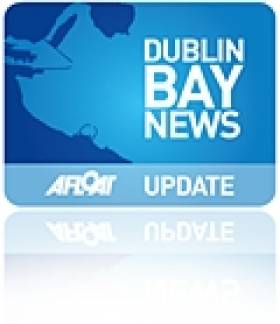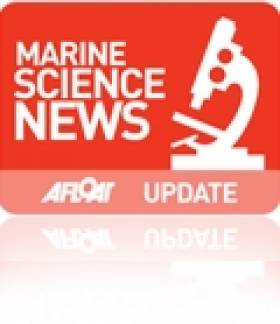Displaying items by tag: Ports and Shipping
The older sisters will both be replaced when the second newbuild Seatruck Power (for previous report click HERE) comes on stream in mid-February 2012.
{youtube.com}=90b-c1j0S_E{/youtube.com}
Launching of M.V. Seatruck Power at FGS, Germany
Seatruck, which claims 20% of the Irish Sea market compared to just 3.7% in 2004, says it will transport 300,000 units in 2011 on its four routes: Dublin-Liverpool, Dublin-Heysham, Warrenpoint-Heysham and Larne-Larne. With the introduction of the newer larger vessels, Seatruck is aiming at the 45% of Irish Sea freight market that is still driver-accompanied.
Alistair Eagles, MD of Seatruck (Irish Sea) says that his company's share of unaccompanied freight volumes is set to grow in 2012, although the total Irish Sea ro-ro market is set to remain static next year, but better than a 1% decline in 2011.
Mr Eagles said: "We believe that our sector of the market — freight-only unaccompanied — will continue to grow. By offering pure freight services we can keep the costs down relatively lower compared with the combined passenger and freight ferry operators.
"We are seeing a switch away from driver-accompanied shipments because hauliers can save quite a lot of money."
Seatruck also benefited from a radical shake-up on the Irish Sea ferry market, with largescale withdrawals of capacity by DFDS and other changes, notably taking over the Dublin-Heysham route in February, to read more click HERE. The route is served by the chartered 120-unit Anglia Seaways which has accommodation for 12 drivers.
As for the remaining newbuild pair, they are scheduled for delivery from FGS during the first half of 2012 and deployed on yet-to-be announced routes. Like the new quartet, the same number were ordered of the 'P' class which entered service from 2008 onwards which included Clipper Pace and Clipper Panorama which currently operate 22 weekly on Warrenpoint-Heysham sailings.
Seatruck also operate Clipper Ranger and Arrow on Larne-Heysham sailings where they each provide a capacity of 65 units and offer a limited number of driver accompanied traffic accommodation in en-suite cabins.
New Arklow Bulker Docks In Dublin to Load at Tara Mines Facility
She has a gross tonnage of 2,998 and a single-box hold with two portable bulkheads which can be placed into 10 positions for cargo separation. At 4,800 dwt, ship is certified for the carriage of dangerous goods of IMO Class 4.1, 4.2, 4.3, 5.1 and 5.2 (packaged) as well as general bulk cargoes. The main engine is a MAN 6L27/38 2040kW gearbox with CPP, delivering about 12 knots.
The 89m Arklow Forest was one of the 4,500 dwt 'R' class designs but was modified to allow carriage of a further 300 tonnes of cargo. She follows Arklow Field (PHOTO) which entered service this year and to read a report on another F class, Arklow Future click HERE.
Arklow Shipping Ltd with its headquarters in Co. Wicklow operate the fleet which in the majority are Irish registered. Some vessels though are managed through Dutch subsidiary Arklow Shipping Netherland B.V. based in Rotterdam where they are also registered in that port.
Giant New Car Truck Carrier Docks in Dublin
She is operated by Wallenius Wilhelmsen Lines (WWL) and was built by Daewoo Shipbuilding & Marine Engineering. The new vessel's principle dimensions are (length: 227.8m, beam: 32.26 and a draft of 11.3m) and she has a deadweight (metric tonnes) of 30,900.
The Swedish company together with subsidiaries and partner's, operates a fleet of about 135 vessels. Of these, Wallenius owns or charters around 35. They can carry up to 8,000 cars, or a combination of cars, trucks, cranes, large rolls of paper and rubber or large turbines. They have also transported parts for wind turbines, luxury yachts, complete train-sets and aircraft wings.
Figaro's docking in Dublin today was at berth 33, which is the centre berth of three lining Ocean Pier which has a quayside totalling 410m long. The pier is within Alexandra Basin and is to the east side of this dock which is approached from the port channel opposite the Poolbeg Marina.
After Dublin she continues her global schedule to Bremerhaven (16 Nov), Zeebrugge (23 Nov), Southampton (24 Nov), Baltimore, USA (3 Dec), Savannah, GA USA (6 Dec), Manzanillo, Panama (11 Dec), Auckland (29 Dec), Brisbane in the New Year (2 Jan) and two days later is expected to dock in Port Kemble also in Australia.
Earlier this year the world's largest ro-ro carrier Tonsberg (PHOTO) also part of the WWL fleet, docked in Dublin having entered service in March. She has a cargo volume of 138,000 cubic metres, some 10% greater than the largest ro-ro vessels in service including her fleetmate the Figaro.
The 74,622grt vessel is the first of four Mark V class on order from Mitsubishi Heavy Industries in Nagasaki, Japan. They are capable of handling handle high and heavy cargo such as excavators, bulldozers, wheel loaders and harvesters. Her sister Parsifal followed in September and the final pair of the quartet are due for delivery in 2012.
Farewell as Stena Line’s ‘Lynx’ Fast-Ferry Sets Sail for South Korea
Sunflower 2 is to make bunker calls on the repositioning voyage, firstly in Valletta, Malta before she transits the Suez Canal to the Red Sea port of Jeddah, Saudi Arabia and Columbo, Sri Lanka. From there she transits the Strait of Malacca then through the South China Sea followed by the East China Sea before finally entering the Strait of Korea to her homeport of Busan.
Since 1999 she has served Stena Line's fast-ferry high-season Rosslare-Fishguard route sailings taking 1 hour 50 minutes in tandem with conventional ferry Stena Europe (1981/24,828grt) which currently maintains the year-round 3 hours 30 minutes route. It is believed that Stena Line will not be operating high-season fast-ferry services in 2012.
Prior to her Dun Laoghaire departure, her South Korean crew have been preparing the craft over the last three weeks. Notably there was the removal of all Stena Line corporate livery markings on the hull. Her new name and port of registry were painted at the stern though she retained her original name at the bow which included both symbols of an Irish shamrock aptly to starboard (green) and the Welsh dragon to port (red) to reflect her Irish Sea southern corridor route.
Stena Lynx III departing Dun Laoghaire last year, note her starboard 'Shamrock' at the bow.
In recent years on the St. Georges Channel route she was marketed as the Stena 'Express'. Her final sailing this year was 4 September and three days later she docked Dun Laoghaire at St. Michaels Pier. On the adjacent berth which is designed specifically for and only capable of accommodating the HSS 1500 class fast-ferries.
Stena Lynx III also ran several shoulder season stints on the Dun Laoghaire-Holyhead route with the HSS Stena Explorer (1996/19,638grt) only running during the busier summer months. During this summer all sailings were maintained by HSS Stena Explorer until the route became a seasonal-only service for the first time this year when the last sailing took place in mid-September. The HSS remains in layover for the winter in Holyhead at her dedicated berth. The route is due to re-open in April or May.
The 35 knot Stena Lynx III was launched from fast-ferry catamaran specialists InCAT Pty based in the Tasmanian capital of Hobart. Early in her career the 81m wave-piercing catamaran (WPC) craft served Dover-Calais followed by two seasons between Newhaven-Dieppe when renamed P&O Elite for joint operators P&O Stena Line.
Her predecessors the WPC InCat 74m Stena Sea Lynx, became the first car-carrying catamaran to operate Dun Laoghaire-Holyhead sailings in 1993. The pioneering water-jet propelled craft was replaced in subsequent years by the larger InCAT 78m Stena Lynx II.
She was replaced in 1996 when the revolutionary four gas-turbine engine water-jet propelled HSS Stena Explorer was introduced. A further two sisters of the HSS 1500 class (High-speed Sea Service) were completed by Finnyards in Rauma.
- Dublin Port
- Dublin Bay News
- HSS Stena Explorer
- Dun LaoghaireHolyhead
- Stena Lynx III
- Ports and Shipping
- Dun Laoghaire Harbour
- Stena Line
- Ports and Shipping News
- Ferry news
- DoverCalais
- HSS
- RosslareFishguard
- Stena Express
- InCat
- Finnyards
- Dun Laoghaire Harbour News
- Irish Sea fastferries
- Sunflower 2
- P&O Elite
- Highspeed Sea Service
- St.Michaels Pier Dun Laoghaire
Lecture: The Vasa-Fifty Years On
The lectures are usually held on the third Thursday of each month and mostly in Stella Maris. The club is located between the Irish Life Mall car park (ILAC), the Customs House and Busaras. It is convenient to the Luas (Busaras stop) and the Dart (Tara Street station). For more information on visit www.mariner.ie/lectures
Masterplan for Shannon Foynes Port Company
Port expansion options are to be examined so to prepare ports for larger trade volumes when the opportunities arise. Also under consideration are the non-core assets at the Port of Foynes and Limerick Docks. To read more about the masterplan and the challenges and issues that has been identified in both ports click HERE.
The statutory jurisdiction of the estuary is under the control of SFPC, which is responsible for the estuary that runs from the mouth entrance marked by Kerry and Loop Heads and stretching far inland to Limerick City. The natural waterway can handle vessels of up to 200,000 deadweight tonnes (dwt) which are the largest ships that can dock in Irish waters.
Wexford Welcomes New Irish-French Ferry Celtic Horizon
The changeover of vessels coincides with the existing Rosslare-Cherbourg sailing schedule of three round-trips per week, noting there are no sailings from the Wexford port on Mondays. Celtic Horizon is due to be introduced with her maiden 'Irish' voyage on Tuesday night, departing Rosslare at 21.30hrs. On the following Monday she is to be officially launched onto the service.
Celtic Horizon will boost capacity on the French route, offering a wider choice of restaurants, bars and a children's play-room. She can carry 840 passengers, 200 cars and 120 freight vehicles. The 186m ferry is from a ro-pax series (including Norman Voyager) designed and built by Cantiere Navala Visentini based in Portoviro, outside Venice.
During her five-day repositioning route from the Mediterranean, Celtic Horizon made an en-route call to Gibralter, anchoring off the British colony on Thursday. Another of the same Visentini ro-pax class vessels, Cartour Epilson is believed to have taken over Celtic Horizon, formerly named Cartour Beta when she served her last season between Termini Imerese in Sicily to Salerno while on charter to C&T.
CLF will be the only ferry operator running services to France, between 2 January -19 February 2012, as Irish Ferries, which also operates on the Rosslare-Cherbourg route, will be taking off Oscar Wilde for annual dry-docking. For schedules click HERE.
In addition there will be no sailings between Cork-Roscoff, as Brittany Ferries final sailing for this year is 29 October, served by 'flagship' Pont-Aven. The 2012 season starts in late March.
Manx Seasonal Visitor to Dublin Port
Following this mornings Irish route sailing, she resumed on her regular Douglas-Heysham route and she also serves Douglas-Birkenhead (Liverpool) during the winter months.
During the summer Dublin-Douglas sailings are served by fast-ferry catamaran Manannan (1998/5,743grt). The 96m InCAT built in Hobart,Tasmania had also operated Douglas-Belfast high-season crossings. Her roster is now confined to a Douglas-Liverpool sailing schedule.
Ben-My-Chree (photo) is Manx for 'Girl of my heart' and her island owners commissioned the 12,504grt ro-pax from Dutch shipbuilders Van de Giessen-de Noord. The 125m ferry was launched in 1998 and she can accommodate 630 passengers,275 vehicles and 1,235 freight lane-metres.
This particular ro-pax design has also been built for Channel Islands operator Commodore Ferries with their Commodore Clipper and a Scandinavian ferry operator. In addition another Dutch shipbuilder, Merwede built a multi-support vessel (MRV) derived from the design of Ben-My-Chree for the Royal New Zealand Navy when they commissioned HMNZS Canterbury (L421). Click for similar port-side photo view to compare differences.
Incidentally the Manannan prior to entering service last year for the IOMSPCo. was for five years chartered initially to the United States Navy but transferred to the United States Army Forces. To read more click HERE.
Work In Progress in Dun Laoghaire Maritime Museum
Following the one-day soft-opening, any group which wishes to visit the museum by appointment should contact the MII's Tel: (01) 280 0969 or you can also call (01) 214 3934.
To read more about the renovation programme click HERE. If you would like to assist through voluntary work, fund-raising activities or make a donation in addition to keeping abreast of news, events and winter lecture programme visit www.mariner.ie
According to the vessels survey schedules, RV Celtic Explorer had today completed fisheries demersal surveys which started in Galway on 23 September. The near fortnight-long survey was conducted in the ICES area VI, under the direction of chief scientist, Dave Stokes.
On Friday she embarks on a herring acoustic survey which is to take place in the Celtic Sea and the south-west. This survey will be under chief scientist Ciaran O'Donnell and is to de-mobilise in Cork on 27 October. To read more about her 2011 survey programme click HERE.
Across Dublin Bay in neighbouring Dun Laoghaire, the 31m RV Celtic Voyager is currently nearing the end of a month-long hydrography survey of the Celtic Sea. The survey had started in Howth Harbour on 17 September under chief scientist Kevin Sheehan. For the time-being she remains moored in Dun Laoghaire prior to resuming survey work which will continue until the vessel de-mobilises in Rosslare in mid-October. To find out more about her remaining surveys for this year click HERE.
On the surveys outlined they are conducted on behalf of Marine Institute scientists, though the vessels are also allocated ship-time for use of third parties. These include government departments and agencies, universities, research institutes and industry. For further information on the research vessels, survey schedules etc can be found by visiting: www.marine.ie/home/Research+Vessels.htm



























